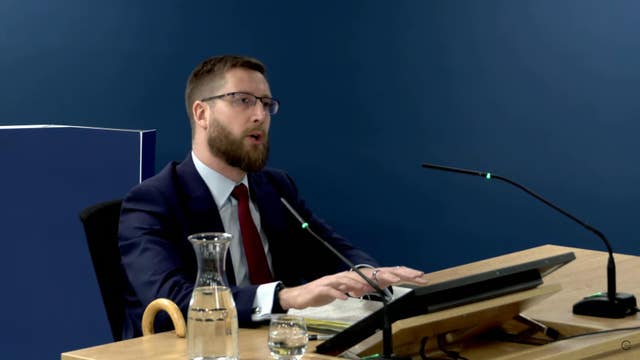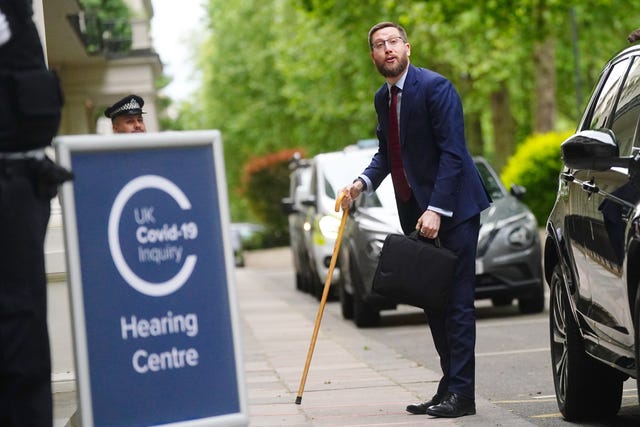Simon Case says WhatsApps about Johnson’s government were ‘raw, in the moment’
The UK’s top civil servant was quizzed on WhatsApps showing his exasperation with the pandemic response under Boris Johnson.

Cabinet Secretary Simon Case said his WhatsApp messages criticising Boris Johnson’s Government were “raw, in-the-moment” expressions that he regretted but remained frank about his concerns as he answered questions at the Covid-19 Inquiry.
Lead counsel to the inquiry Hugo Keith KC quizzed Mr Case on some of his WhatsApp messages that emerged during evidence to the inquiry last year, many of which show his exasperation with the handling of the pandemic under Boris Johnson’s premiership.
The UK’s top civil servant acknowledged that his messages, which include referring to Mr Johnson and his inner circle as “basically feral,” form part of the historical record for the Covid-19 inquiry as he gave evidence on Thursday.
“They are very raw, in-the-moment human expressions – they’re not the whole story but I recognise they’re part of the story. Many of them now require apologies for things that I said and the way I expressed myself,” Mr Case said.
He sought to soften his descriptions of his time as civil service chief in Mr Johnson’s government while maintaining the message that there were widespread issues.
Asked about negative WhatsApps he sent regarding Mr Johnson, Mr Case said: “Those are examples that I obviously now deeply regret of expressing my in-the-moment frustrations with the former prime minister.”

But he said it was a “fair conclusion” to draw that a WhatsApp message he sent saying “Crisis + pygmies = toxic behaviour” was an observation on the abilities of individuals in the Cabinet Office and Number 10.
He also said: “Good people were working incredibly hard in impossible circumstances with choices where it seems there was never a right answer.
“But that lack of sort of a team spirit, the difficult atmosphere, we were trying to run everything from the centre of government, trying to run the response to a global pandemic.”

He also spoke of external pressures that influenced how the government acted, saying there were some “dark days when it felt we just couldn’t get it right.”
He said there was a “tussle” to get the right people in the room with Mr Johnson when he started in his role.
Asked about a message where he’d written that good people were put off working at Downing Street because it was such a “rat’s nest,” he said: “That is correct.”
He added: “I mean, we did get very good people to come into the Covid taskforce, but… that ended up being quite a separate entity with its own sort of cultural ways of working from the rest of Number 10.”
He spoke about an absence of structure, saying it was “very difficult” to get structured ways of working, but also maintained that the job of civil servants is to “keep the government going as best we can and adapt to the personalities around us and try and make it work.”
The Cabinet Secretary also said he had “intervened to try to get serious discussions off WhatsApp” during Mr Johnson’s government.
Mr Case said the first specific policy by Downing Street on WhatsApp was introduced in March 2021, but by that point it had become “an ingrained way of working”.
Mr Case’s appearance follows his return to work as Cabinet Secretary after he stepped back in October due to a medical matter.
In July 2020, before he became Cabinet Secretary, he said “I’ve never seen a bunch of people less well-equipped to run a country” in a message to Lord Sedwill, who was the Civil Service chief at the time.
He also described Mr Johnson and his inner circle as “basically feral” and suggested the then-prime minister’s wife Carrie was “the real person in charge” in No 10.
Mr Case, who became permanent secretary at 10 Downing Street in May 2020 and later became Cabinet Secretary in September that year, was absent from hearings last year when other senior Westminster figures gave evidence for medical reasons.
The Covid-19 inquiry began in June 2022 and is made up of several modules. Mr Case’s evidence brings to an end the hearings for module 2, which focuses on core UK decision-making and political governance.
Inquiry Chair Baroness Heather Hallett will now consider the evidence. She did not set a publication date for her report and recommendations.
The next evidence hearing of the inquiry, which will address module 3 on healthcare, will be in September.





